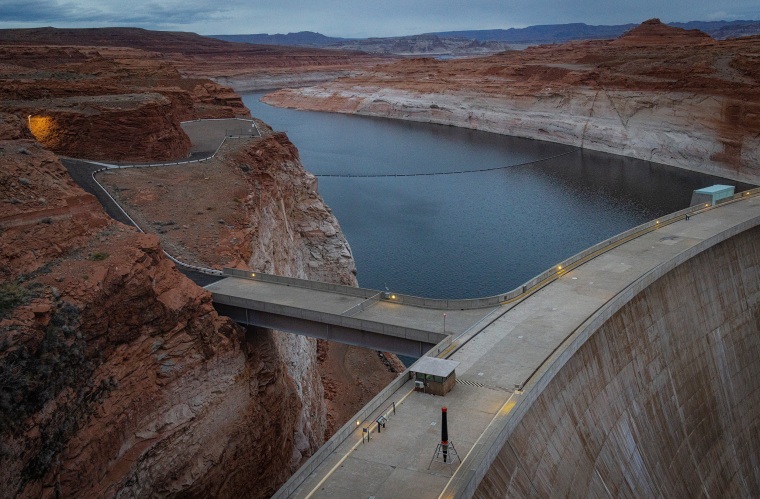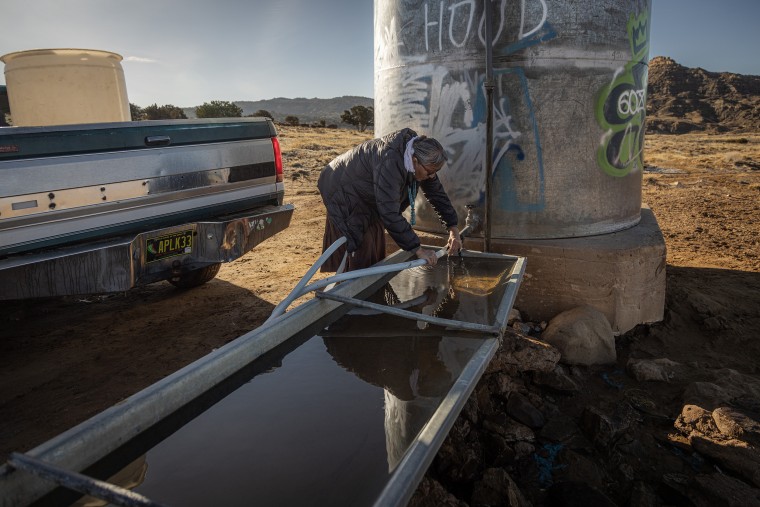The justices heard arguments on whether a Navajo lawsuit claiming the federal government has a duty to address the tribe's water rights can move forward.
Navajo Nation argues water rights case before Supreme Court
01:14
March 20, 2023
By Lawrence Hurley
WASHINGTON — The Supreme Court appeared closely divided on Monday as it grappled with whether to allow the Navajo Nation to pursue a claim that the federal government has a duty to address the Native American tribe's water rights.
During the almost two-hour oral argument, it appeared a majority on the nine-justice court could allow the tribe's claim to move forward in a limited form, with much depending on the vote of conservative Justice Amy Coney Barrett.
The case touches upon the complex array of agreements and court decisions that over decades have dictated how the waters of the Colorado River, divided into upper and lower sections, are allocated among the states. Further complicating matters, the Colorado River system is already depleted due to long-term drought conditions, with the longer-term threat of climate change looming in the future.
The tribe, citing years of mistreatment, wants rights to waters in the Lower Colorado River that flows along the Navajo reservation's northwestern border. The tribe’s land, the largest Native American reservation, is mostly in Arizona but also crosses into New Mexico and Utah.
The court, which has a 6-3 conservative majority, heard two consolidated appeals — one brought by the federal government and another by the states of Arizona, Nevada and Colorado, in addition to several California water districts.
The dispute is over whether the government had a legal duty that the tribe can enforce in court. The tribe, which signed a key treaty with the federal government in 1868, argues that under its agreements with the federal government that assured it would have access to land, it was assumed that the government also had a duty to provide necessary water.
The three liberal justices as well as conservative Justice Neil Gorsuch seemed sympathetic to the tribe's arguments. Other conservatives seemed more skeptical, although Barrett asked tough questions of both sides.
Gorsuch, who frequently votes in favor of Native Americans, focused on language in the 1868 treaty that guaranteed the tribe a permanent homeland.
"Is it possible to have a permanent home, farm, and raise animals without water?" he asked.
Liberal Justice Elena Kagan questioned the government's argument that although the treaty does guarantee some water access, there is no way for the tribe to vindicate those rights.
"If the treaty promises water, where do you get the idea that this is unenforceable?" she asked government lawyer Frederick Liu.
The federal government says the tribe is seeking to reopen already decided cases that determine how water in the river is allocated, but Barrett seemed to indicate she agreed with the tribe that the lawsuit did not necessarily require that to happen.
However, she also seemed concerned that the litigation could be used to impose additional burdens on the federal government, such as a requirement that it build pipelines.
In an exchange with the tribe's lawyer, Shay Dvoretzky, Barrett sought assurances that the tribe's claims would be narrower in scope.
"So it's really just about intervening in litigation to assert rights on the Navajo's behalf and to protect them, right, like to safeguard those rights so you're not deprived of them?" she asked.
"I think that's right, Justice Barrett," Dvoretzky said. Glen Canyon Dam in Page, Arizona. Sharon Chischilly for NBC News
Glen Canyon Dam in Page, Arizona. Sharon Chischilly for NBC News
Aside from Gorsuch and Barrett, conservative justices seemed considerably more skeptical about the Navajo lawsuit.
If water was key to the treaty, "why wasn't the water mentioned?" Chief Justice John Roberts asked.
Justice Samuel Alito raised the "real world impacts" of the tribe's claim, questioning the negative impact it could have on the water allocated to surrounding states.
He also questioned whether the tribe could obtain the water it needs without having to reopen the complex apportionment of Colorado River waters.
"Is there any possibility that you can get the water that you think that you need from sources other than the Colorado River?" he asked Dvoretzky.
The Biden administration and the three states appealed after the San Francisco-based 9th U.S. Circuit Court of Appeals ruled in favor of the Navajo Nation in 2021, saying it could sue the government for an alleged failure to carry out its duties on behalf of the tribe.
The tribe argues that it is not seeking a decision on rights to the lower Colorado River specifically. Instead, its lawyers say that the federal government’s oversight of the entire Colorado River as well as its duties to the tribe mean that it is required to do a full assessment of the Navajo Nation’s water rights, which may affect how water from the Colorado River is allocated.
Colorado’s lawyers said in that state’s brief that a ruling for the tribe would cause “immediate and long-term disruptions to the coordinated management of the Colorado River."
States point out they are already implementing a 2007 agreement on water shortages as well as a drought contingency plan adopted in 2019.
The tribe, citing years of mistreatment, wants rights to waters in the Lower Colorado River that flows along the Navajo reservation's northwestern border. The tribe’s land, the largest Native American reservation, is mostly in Arizona but also crosses into New Mexico and Utah.
The court, which has a 6-3 conservative majority, heard two consolidated appeals — one brought by the federal government and another by the states of Arizona, Nevada and Colorado, in addition to several California water districts.
The dispute is over whether the government had a legal duty that the tribe can enforce in court. The tribe, which signed a key treaty with the federal government in 1868, argues that under its agreements with the federal government that assured it would have access to land, it was assumed that the government also had a duty to provide necessary water.
The three liberal justices as well as conservative Justice Neil Gorsuch seemed sympathetic to the tribe's arguments. Other conservatives seemed more skeptical, although Barrett asked tough questions of both sides.
Gorsuch, who frequently votes in favor of Native Americans, focused on language in the 1868 treaty that guaranteed the tribe a permanent homeland.
"Is it possible to have a permanent home, farm, and raise animals without water?" he asked.
Liberal Justice Elena Kagan questioned the government's argument that although the treaty does guarantee some water access, there is no way for the tribe to vindicate those rights.
"If the treaty promises water, where do you get the idea that this is unenforceable?" she asked government lawyer Frederick Liu.
The federal government says the tribe is seeking to reopen already decided cases that determine how water in the river is allocated, but Barrett seemed to indicate she agreed with the tribe that the lawsuit did not necessarily require that to happen.
However, she also seemed concerned that the litigation could be used to impose additional burdens on the federal government, such as a requirement that it build pipelines.
In an exchange with the tribe's lawyer, Shay Dvoretzky, Barrett sought assurances that the tribe's claims would be narrower in scope.
"So it's really just about intervening in litigation to assert rights on the Navajo's behalf and to protect them, right, like to safeguard those rights so you're not deprived of them?" she asked.
"I think that's right, Justice Barrett," Dvoretzky said.
 Glen Canyon Dam in Page, Arizona. Sharon Chischilly for NBC News
Glen Canyon Dam in Page, Arizona. Sharon Chischilly for NBC NewsAside from Gorsuch and Barrett, conservative justices seemed considerably more skeptical about the Navajo lawsuit.
If water was key to the treaty, "why wasn't the water mentioned?" Chief Justice John Roberts asked.
Justice Samuel Alito raised the "real world impacts" of the tribe's claim, questioning the negative impact it could have on the water allocated to surrounding states.
He also questioned whether the tribe could obtain the water it needs without having to reopen the complex apportionment of Colorado River waters.
"Is there any possibility that you can get the water that you think that you need from sources other than the Colorado River?" he asked Dvoretzky.
The Biden administration and the three states appealed after the San Francisco-based 9th U.S. Circuit Court of Appeals ruled in favor of the Navajo Nation in 2021, saying it could sue the government for an alleged failure to carry out its duties on behalf of the tribe.
The tribe argues that it is not seeking a decision on rights to the lower Colorado River specifically. Instead, its lawyers say that the federal government’s oversight of the entire Colorado River as well as its duties to the tribe mean that it is required to do a full assessment of the Navajo Nation’s water rights, which may affect how water from the Colorado River is allocated.
Colorado’s lawyers said in that state’s brief that a ruling for the tribe would cause “immediate and long-term disruptions to the coordinated management of the Colorado River."
States point out they are already implementing a 2007 agreement on water shortages as well as a drought contingency plan adopted in 2019.
\

Marilyn Help-Hood prepares to fill up water jugs in Tolkakai, New Mexico, last week.
Sharon Chischilly for NBC News
The Navajo Nation can access water from other sources, including the San Juan River, a tributary of the Colorado River, but the tribe says that is not enough. Many tribal members do not have access to running water and rely on wells and other localized water sources.
The tribe originally sued the federal government in 2003 seeking access to the main branch of the lower Colorado River, with the litigation dragging on ever since. In separate litigation in state court the tribe has fought for access to the Little Colorado River, another tributary of the Colorado River.
A previous attempt to settle Navajo claims to the lower Colorado River failed about a decade ago.

The Navajo Nation can access water from other sources, including the San Juan River, a tributary of the Colorado River, but the tribe says that is not enough. Many tribal members do not have access to running water and rely on wells and other localized water sources.
The tribe originally sued the federal government in 2003 seeking access to the main branch of the lower Colorado River, with the litigation dragging on ever since. In separate litigation in state court the tribe has fought for access to the Little Colorado River, another tributary of the Colorado River.
A previous attempt to settle Navajo claims to the lower Colorado River failed about a decade ago.

Lawrence Hurley covers the Supreme Court for NBC News Digital.
No comments:
Post a Comment